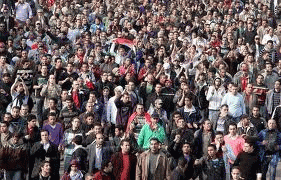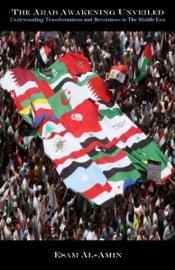Almost immediately after their success in ousting the despised dictator Hosni Mubarak, the groups that carried the revolution on their shoulders parted ways on ideological grounds. At one end of the political spectrum are the Islamist groups led by the Muslim Brotherhood (MB) movement and its political affiliate, the Freedom and Justice Party (FJP). Since the revolution these groups have grown to more than 30 political parties ranging from the conservative Salafist parties such as Al-Noor, Al-Watan, Al-Raya, and the Salafist Front, to Jihadi turned political groups such as the Building and Growth Party, the political arm of the Islamic Group (IG), to moderate ones such as Al-Wasat (Center) and Al-Nahdha (Renaissance) parties.
On the other end are the secular and liberal parties which include the traditional Al-Wafd Party, as well as dozens of others such Al-Dustoor (Constitution) led by former IAEA head, Dr. Muhammad ElBaradei; the Congress Party led by former Secretary General of the Arab League, Amr Mousa; the Popular Current led by former presidential candidate Hamdein Sabbahi, and Free Egyptians Party founded by billionaire and Egyptian Copt, Naguib Sawiris.
But ever since the ouster of Mubarak, the Egyptian political scene has been messy and confusing. The youth groups that led the initial uprising in late January 2011 have since been frustrated and marginalized by the political wrangling that engulfed the country. Meanwhile, the MB and their Islamist allies were able to dominate it by not only winning the parliamentary and presidential elections in 2012 but also by controlling the Constitutional Constituent Assembly that oversaw the writing of the new constitution, which was eventually approved by the Egyptian people earlier this year with 64 percent of the vote.
When the MB candidate Dr. Muhammad Morsi won the presidency a year ago, there was hope among the revolutionary partners that a new era based on genuine partnership and cooperation would ensue, particularly when Morsi was able to sideline the military's control over Egyptian political life within a few weeks of being sworn in. Yet, by the end of the year, many opposition and youth groups, which have been wary or resentful of MB rule, became even more open in their antagonism and hostility.
With some merit, the opposition charges that the president and the MB have not fulfilled their promises of restoring security, instituting social justice, and sharing power. They also accuse Morsi of inexperience, if not outright incompetence, which they argue, exposed the country to national security risks. For instance, on several occasions the president made decisions and issued decrees, most notably the fateful constitutional decree last November -- only to cancel them within few weeks, days, or even hours. The opposition also accuses Morsi of appointing MB officials or Islamists to the most senior positions in government without any regard to qualifications or power sharing.
Recently, he appointed a former leader of IG as governor in Luxor, an important tourist destination. During the 1980s, the IG embarked on a violent campaign that killed dozens of tourists before repudiating violence in the 1990s. Although well-intentioned, this insensitivity was not lost on the people of Luxor who never overcame their resentment of the group's early violent campaign. In early June, Morsi abruptly cut off Egypt's relations with Syria, citing the regime's brutality towards its people. His critics charge that such a move was ill-advised since it would marginalize Egypt's role in any future settlement at a time of fever-pitch sectarian conflict in the region. Last fall, Morsi proposed a regional-based engagement towards a resolution in Syria that would have involved such powers as Egypt, Iran, Turkey, and Saudi Arabia. This idea is now dead. As for the crisis with Ethiopia over the Renaissance Dam that would substantially cut Egypt's share of the Nile, the opposition accuses the president of badly mishandling the issue, seriously threatening Egypt's national and economic security in the process.
On the other hand, Morsi and the MB point to their repeated attempts to engage the political opposition only to be rebuffed time and again. He called all the opposition leaders, especially within the National Salvation Front (NSF) that includes most of the secular opposition, to as many as ten separate meetings with minimal success. As for the appointments, Morsi's political advisor Bakinam El-Sharqawi stated recently that whenever the president asked the secular groups for candidates for the most senior positions in government including ministers and governors, they refused to engage or send any nominees while the Islamic parties led by the FJP readily submitted their lists.
But what most political groups overlook are the terrible conditions the country has faced since the fall of the Mubarak regime. The deterioration in security and the lack of productivity have affected all aspects of economic life. Investments have almost stopped and tourism (a major source of foreign currency) has been seriously curtailed. Inflation and unemployment have soared. Services have deteriorated while electricity is erratic. Gasoline is scarce and rationed. Poverty has increased from 40 to more than 50 percent.
The Egyptian Center for Social and Economic Rights reported that during 2012 there were 581 local protests, 558 demonstrations, 514 labor strikes, 500 sit-ins, and 561 highway robberies. Such protests and strikes have only increased in 2013 as the International Development Center in Cairo reported that in the month of May alone there were 55 different forms of protests including those surrounding several ministries and government agencies that disrupted government services as well as the refusal of many to pay taxes and electricity bills.
Throughout these tumultuous events, the fulool or remnants of the Mubarak regime were lying low during the first year of the transitional military rule. But by mid-2012 they had regrouped as they coalesced around presidential candidate Ahmad Shafiq, Mubarak's last prime minister, who lost in the second round by a mere 2 percent. By year's end the fulool groups have become part and parcel of the secular opposition groups and a major factor of the instability that has overwhelmed the country. Perhaps the most serious mistake committed by the revolutionary groups was to underestimate the dangers of the fulool lurking behind the scenes. Many of these groups loyal to the former regime are still largely in control of the security apparatus, most of the private media, the judiciary, as well as major industries and influential economic institutions. In short, they still had substantial power that could undermine any genuine efforts to carry out the objectives of the revolution.
In the ideological battle that ensued between the former revolutionary partners, the fulool were able to reinvent themselves and become major players on the side of the secular groups against the MB and the Islamists. Recently, ElBaradei welcomed all elements of Mubarak's banned National Democratic Party to join his party and the opposition, while Sabbahi declared that the battle with the fulool now is secondary as the primary conflict today is with the MB and its Islamist allies.
Furthermore, throughout the first year of Morsi's rule, the attacks by the opposition media on the MB rule has not only been ceaseless but in many cases vulgar. Meanwhile, the judiciary, led by the Mubarak-era Supreme Constitutional Court, reversed most attempts to build the country's democratic institutions. They ruled as unconstitutional the elections of the parliament and subsequently dissolved the body on technical grounds. They ruled against the new election laws that would have paved the way for new parliamentary elections. They ruled against the appointment of the General Prosecutor and demanded the return of the corrupt Mubarak appointee who was dismissed by Morsi last November.
The courts are even now looking into a lawsuit by Shafiq challenging the election and legitimacy of Morsi, a year after becoming a president. Adding insult to injury, the judiciary has either declared innocent or overturned the convictions of all senior officials of the Mubarak regime including Mubarak and his sons. Even low level security officials with overwhelming evidence against them of killing and torturing protesters have been released prompting Zakaria Abdul-Aziz, an independent and respected former judge who stood against Mubarak for many years, to say that 90 percent of Egypt's judges are acting to overturn the gains of the revolution.
By this April, the country was at an impasse. The ruling party continued to demonstrate its unwillingness to share power or be magnanimous to its rivals for the sake of national unity and building consensus. Its main plan has been centered on winning the next parliamentary elections to consolidate its control and enable it to form the next government. Its central economic program is to finalize the IMF loan in order to secure more loans and capital from wealthy countries for investments and plugging the budget hole. It did not take seriously the opposition groups arguing that they were elitist and lacked popular depth and support.
(Note: You can view every article as one long page if you sign up as an Advocate Member, or higher).






